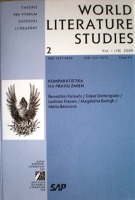„Vnútorná emigrácia“ ako gesto slobody (Dominik Tatarka a Ludvík Vaculík po roku 1968)
The Inner Emigration as a Gesture of Freedom (Dominik Tatarka and Ludvik Vaculík after 1968)
Author(s): Mária BátorováSubject(s): Literary Texts
Published by: Ústav svetovej literatúry, Slovenská akadémia vied
Keywords: Dissent; Inner emigration; Year 1968 in Czechoslovakia; Alexander Dubček; Charter 77; Comparison of Slovak and Czech cultural sphere
Summary/Abstract: The fundamental difference between the Slovaks and the Czechs after the political normalization in 1968 and later during the times of consolidation (apart from the Slovak effort to gain independence or different sanctions imposed by the ruling party) lies in the carriers of alternative culture and their contribution. There were self-educated intellectuals and university-educated scholars in Bohemia such as V. Havel, J. Gruša, L. Vaculík, J. Patočka or M. Machovec. However, these were rather thinkers than artists, who were in minority. In contrast, Slovakia had mainly artists and academics in various fields, to which they often remained confined, as well as catholic intellectuals (J. Korec, F. Mikloško, etc.). For the most part they published the results of their free analyses in Samizdat at the end of the 1960s, and later they organized meetings for a short period of time (e. g. T. Strauss, M. Kusý, J. Jablonický, etc.). In the years to follow they protested in isolation. The only exceptions before 1968 formed discussion groups, which were organized under the name of a socialist institution and which went underground during the time of political consolidation, as well as the candle demonstration for religious freedom in Bratislava in 1988. Dominik Tatarka was the major figure of Slovak dissent which also included M. Kusý, H. Ponická, and T. Petřivý. The study focuses on Tatarka’s aesthetic and sociological essays about the genesis and history of the nation, which reflect his “prírodo a zemepis” (“natural science and geography”), and on his authentic notes that bear witness to the times he lived in. The study also follows Tatarka’s life after 1968.
Journal: World Literature Studies
- Issue Year: I/2009
- Issue No: 2
- Page Range: 58-75
- Page Count: 18
- Language: Slovak

